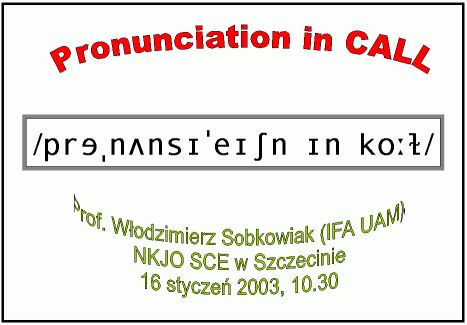
1. Introduction: pronunciation, EFL, CALL
2. Computer-assisted pronunciation teaching and learning
a) CALL didactic flexibility in terms of approach, method, technique
b) coverage: segmentals, suprasegmentals, fast speech, grapho-phonemics, accents
c) declarative vs. procedural, knowledge vs. skill, know-that/what vs. know how
d) L1 sensitivity, learner model, error anticipation
e) technology: text-based vs. multimedia
f) visual sound representation: transcription, acoustics (waveform/spectrogram), articulation
g) audio: speech input --> recording --> recognition (ASR) --> visual interaction (?)
3. 10 years ago: CALL without ASR - pop-english 3 for Windows pronunciation component
4. Today: CALL with ASR - a sample of pronunciation-aware EFL CALL programs:
Fluency
Pronunciation Power
Better Accent
Connected Speech
Interactive Spoken Language Education (ISLE) Project
Tell Me More (Talk to Me)
Selected bibliography
Aist,G. 1999. "Speech recognition in computer-assisted language learning". In K.Cameron (ed.). 1999. 165-81.
Asher,R.E. & J.M.Y.Simpson (eds). 1994. The encyclopedia of language and linguistics. Edinburgh: Pergamon Press.
Cameron,K. (ed.). 1999. CALL: media, design and applications. Amsterdam: Swets & Zeitlinger.
Carey,M. 1998. "But is it interactive and does it work? A review of some CALL English pronunciation CD-ROMs". In In T.Ottmann & I.Tomek (eds).1998.
Chen,Hao-Jan H. 2001. "Evaluating five speech recognition programs for ESL learners". Paper presented at ITMELT'2001, Hong-Kong, 9 Nov 1999.
Delcloque,P. (ed.). 2000. Proceedings of InSTIL: Integrating Speech Technology in Learning. University of Abertay Dundee, Scotland.
Derwing,T.M., M.J.Munro & M.Carbonaro. 2000. "Does popular speech recognition software work with ESL speech?". TESOL Quarterly 34.3.592-603.
Donahue,S. 1999. "Teaching pronunciation online". http://fs.broward.cc.fl.us/~sdonahue/teaching-online.html
Ehsani,F. & E.Knodt. 1998. "Speech technology in computer-aided language learning: strengths and limitations of a new CALL paradigm". Language Learning & Technology 2.1.45-60.
Eskenazi,M. 1999. "Using automatic speech processing for foreign language pronunciation tutoring: some issues and a prototype". Language Learning & Technology 2.2.62-76.
Gipe,T.S. 2001. "Speak to me! Speech technologies are making their mark". TechKnowLogia. Nov/Dec 2001.46-8.
Hiller,S.M. & E.J.Rooney. 1994. "Teaching pronunciation with computer aids". In R.E.Asher & J.M.Y.Simpson (eds). 1994. 4528-35.
Hunyadi,L. et al. (eds). 1998. ALLC/ACH'98 conference abstracts. Debrecen: Lajos Kossuth University.
Kaltenboek,G. 2001. "A multimedia approach to suprasegmentals: using a CD-ROM for English intonation teaching". In J.A.Maidment & E.Estebas-Vilaplana (eds). 2001. 19-22.
Keller,E. & B.Zellner-Keller. 2000. "Speech synthesis in language learning: challenges and opportunities". In P.Delcloque (ed.). 2000.
Keller,E. & B.Zellner-Keller. 2000. "New uses for speech synthesis". The Phonetician 81.35-40.
Lambacher,S.G. 1996. "Spectrograph analysis as a tool in developing L2 pronunciation skills". In M.Vaughan-Rees (ed.). 1996. 32-35.
Lecumberri,G., M.Cooke & J.A.Maidment. 2001. "Automatic feedback on phonemic transcription". In J.A.Maidment & E.Estebas-Vilaplana (eds). 2001. 15-18.
Maidment,J.A. & E.Estebas-Vilaplana (eds). 2001. Proceedings of the Phonetics Teaching and Learning Conference, April 5-7 2001, London. London: UCL Dept of Phonetics and Linguistics.
Nagy,T., P.Furkó & A.Tóth. 1998. "Computers and multimedia applications in teaching pronunciation". In L.Hunyadi et al. (eds). 1998.187.
Ottmann,T. & I.Tomek (eds). 1998. Proceedings of ED-MEDIA/ED-TELECOM 98. Chartlottesville,VA: AACE.
Pellegrino,F., C.Fressard & G.Puech. 2001. "Teaching phonetics with a multimodal internet site". In J.A.Maidment & E.Estebas-Vilaplana (eds). 2001. 31-34.
Pennington,M.C. 1999. "Computer-aided pronunciation pedagogy: promise, limitations, directions". CALL 12.5.427-40.
Rudnik,O. 1998. ASR in EFL CALL. IFA UAM MA thesis.
Vaughan-Rees,M. (ed.). 1996. Speak out: newsletter of the IATEFL Pronunciation Special Interest Group (PronSIG). London: IATEFL.
